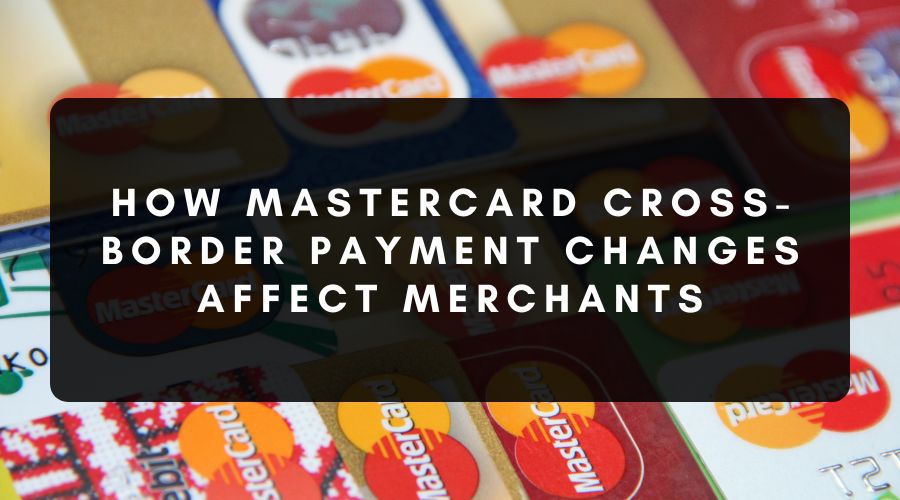How New Changes to Mastercard Cross-Border Payments Could Affect Merchants

If you sell goods or services online (or in any environment with an international presence), Mastercard cross-border payments are an inevitable cost of doing business. These fees are imposed on all Mastercard transactions processed internationally, and they’re a major contributor to the high cost of doing business overseas.
However, Mastercard recently made some changes to their payment process that might have a positive impact on merchants’ bottom line.
What Is a Mastercard Cross-Border Payment?
First, it’s important to clarify our terminology. People often refer to cross-border services or payments when they’re actually referring to cross-border fees, but they’re not exactly the same thing.
In a broad sense, Mastercard cross-border services allow people and businesses to send and receive money securely and with certainty through a single, secure point of access. It’s a full suite of services that affects financial institutions, businesses, and consumers.
The Mastercard cross-border fee, on the other hand, is a charge for transactions involving credit cards issued in another region than where they are acquired. The fee depends on the currency of the transaction and the location of the merchants/banks. The typical fee is 0.60% for transactions settled in your local currency (be it pounds, U.S. dollars, euros, or any other currency that’s native to your business) and 1.00% for transactions settled in a foreign currency. The fee is imposed on top of the regular transaction fees.
If you run an ecommerce business that accepts Mastercard payments, cross-border fees impact your bottom line. They might not show up on the monthly statement sent to you by your merchant provider, but they’re factored into your total transaction and/or merchant account fees just like interchange fees, batch fees, and other fees that might not be on your daily radar.
Mastercard cross-border fees are similar to interchange fees (in that they’re set by the credit card company and factored into the total transaction cost), but the two types of fees should not be confused. Cross-border fees apply exclusively to international transactions. Interchange fees, on the other hand, are imposed on all credit and debit card transactions as one component of the Merchant Discount Rate (MDR) established by acquirers. They’re a special fee imposed on all merchants as payment for card acceptance services.
How Mastercard Cross-Border Payments Are Changing
Recently, Mastercard unveiled a new tool called Cross-Border Services Express, with the goal of bringing international payments into the 21st century. The purpose of the tool is to streamline cross-border payment capabilities and make it easier for people to send money to both businesses and loved ones overseas. The tool covers over 100 markets worldwide and boasts of accommodating 90% of the world’s population.
So what does it mean for vendors? Only time will tell if the new streamlined technology will impact your cross-border fees in the long term, but the service does have major implications for small and medium-sized enterprises (SMEs) that work with smaller banks and credit unions. The tool makes international payments more easily accessible to financial institutions that once struggled to facilitate such payments.
The service offers users flexibility in how payments are made by delivering funds to bank accounts, debit and credit cards, mobile wallets, and cash payout locations with full transparency and reliability over transaction status and delivery time. With Cross-Border Services Express, banks and other financial institutions can speed up the payment process with less transaction risk and deliver a truly modernised payment experience.
Cross-Border Services Express Is Promising but Limited
While Mastercard’s new innovation provides an excellent and much-needed solution for longstanding challenges with international commerce, the service only covers one type of payment. Unicorn Payment has been ahead of these challenges for years by streamlining international payments not just for Mastercard customers but for all major types of debit, credit, e-wallet, and alternative payment customers.
If you’re a serious ecommerce merchant who relies on international customers, it’s absolutely critical that you work with a reputable merchant services provider that accommodates cross-border payments for all types of customers. In most parts of Europe, debit and credit cards aren’t even the dominant payment method anymore (e-wallets have taken over as the preferred cross-border payment solutions), so you have to be ready to meet your customers wherever they are. That’s where Unicorn Payment comes in.
Hopefully the changes to Mastercard Cross-Border Services will mean positive things for merchants moving forward. But you don’t have to wait and see how it plays out. With the right merchant provider, you can get a competitive edge right now. Don’t let the opportunity pass you by.
